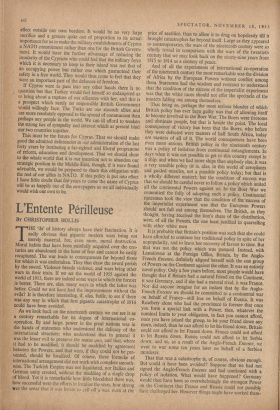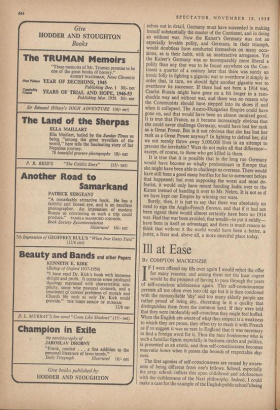L'Entente Nrilleuse
BY CHRISTOPHER HOLLIS THE 'ifs' of history always have their fascination. It is sadly obvious that gigantic modern wars bring not merely material, but, even more, moral destruction. Moral habits that have been painfully acquired over the cen- turies are abandoned in the hour of fear and cannot be easily recaptured. The war leads to consequences far beyond those for which it was undertaken. They that draw the sword perish by the sword. Violence breeds violence, and wars bring other wars in their train. If we set the world of 1955 against the world of 1913, there are indeed some ways in which the former is better. There are, alas, many ways in which the latter was better. Could we not have had the improvements without the evils? It is therefore interesting, if, alas, futile, to see if there was any way in which that first gigantic catastrophe of 1914 could have been avoided.
As we look back on the nineteenth century we can see it as a century remarkable for its degree of international co- operation. By and large, power in the great nations was in the hands of statesmen who understood the delicacy of the international structure; who understood that in general it was the lesser evil to preserve the status quo, and that, where it had to be modified, it should be modified by agreement , between the Powers; and that wars, if they could not be pre- vented, should be localised. Of course, these formuhe of international arrangement did not work with complete smooth- ness. The Turkish Empire was not liquidated, nor Italian and German unity created, without the shedding of a single drop of blood. Yet it is remarkable how little bloodshed there was, how successful were the efforts to localise the wars, how strong was the sense that it was better to call off a war. even at the price of sacrifice, than to allow it to drag on hopelessly till it brought catastrophes far beyond itself. Large as they appeared to contemporaries, the wars of the nineteenth century were so wholly trivial in comparison with the wars of the twentieth century that we may look back on the ninety-nine years from 1815 to 1914 as a century of peace.
And of all the experiments of international co-operation of the nineteenth century the most remarkable was the division of Africa by the European Powers without conflict among them. Statesmen had the wisdom and restraint to understand that the condition of the success of the imperialist experiment was that the white races should not offer the spectacle of the masters falling out among themselves.
That being so, perhaps the most serious blunder of which British policy has ever been guilty was that of allowing itself to become involved in the Boer War. The Boers were tiresome and obstinate people, but that is beside the point. The local consequence of victory has been that the Boers, who before they were defeated were masters of half South Africa, today are masters of all of it. The world consequences have been even more serious. British policy in the nineteenth century was a policy of isolation from continental entanglements. In days when it was not possible to get to this country except in a ship, and when we had more ships than anybody else, it was a very sensible policy (it is, alas, in this world of aeroplanes and guided missiles, not a possible policy today; but that is a wholly different matter); but the condition of success was that we should be careful never to follow a policy which united all the continental Powers against us. In the Boer War we committed the folly of adopting such a policy. Continental statesmen took the view that the condition of the 'success of the imperialist experiment was that the European Powers should not fall out among themselves. The British, as they thought, having received the lion's share of the distribution, were, of all the Powers, the one least justified in quarrelling with other white men It is probable that Britain's position was such that she could have afforded to continue her traditional policy in spite of her unpopularity, and to leave her recovery of favour to time. But that was not the policy which was pursued. Instead, with Lansdowne at the Foreign Office, Britain, by the Anglo- French Entente, definitely aligned herself with the one group of Powers on the Continent against the other. It was an entirely novel policy. Only a few years before, most people would have thought that if Britain had a natural friend on the Continent, it was Germany, and if she had a natural rival, it was France. Nor did anyone imagine for an instant that by the Anglo- French Entente we should be committed to a continental war on behalf of France—still less on behalf of Russia. It was Rosebery alone who had the prescience to foresee that once you form a special link with a Power, then, whatever the nominal limits to your obligation, in fact you cannot afford, once you have joined the group, to let your friend down any more, indeed, than he can afford to let his friend down. Britain could not afford to let France down. France could not afford to let Russia down. Russia could not afford to let Serbia down; and so, as a result of the Anglo-French Entente, we went to war some ten years later on behalf of a Serbian murderer.
That that was a catastrophe is, of course, obvious enough. But could it have been avoided? Suppose that we had not signed the Anglo-French Entente and had continued with a policy of isolation. What would have happened? Germany would then have been so overwhelmingly the strongest Power on the Continent that France and Russia could not possibly have challenged her. However things might have worked them- selves out in detail, Germany must have succeeded in making herself substantially the master of the Continent, and in doing so without war. Now the Kaiser's Germany was not an especially lovable polity, and Germans, in their triumph, would doubtless have conducted themselves on many occa- sions, as is their habit, with an unattractive arrogance. Yet the Kaiser's Germany was so incomparably more liberal a polity than any that was to be found anywhere on the Con- tincnt a quarter of a century later that there was surely an ironic folly in fighting a gigantic war to overthrow it simply in order that, in turn, we should fight another gigantic war to overthrow its successor. If there had not been a 1914 war, Czarist Russia might have gone on a bit longer in a ram- shackle way and without war, and there was no reason why the Communists should have stepped into its shoes if and when it collapsed. The Austro-Hungarian Empire could have gone on, and that would have been an almost unmixed good. It is true that France, as it became increasingly obvious that she could never challenge Germany, would have lost her rank as a Great Power. But is it not obvious that she has lost her rank as a Great Power anyway? In fighting to defend her, did we not merely throw away 5,000,000 lives in an attempt to prevent the inevitable? Wars do not make all that difference— except, of course, to those who get killed in them.
It is true that it is possible that in the long run Germany would have become so wholly predominant in Europe that she might have been able to challenge us overseas. There would have still been a good many hurdles for her to surmount before that happened; but even supposing the worst and most de- featist, it would only have meant handing India over to the Kaiser instead of handing it over to Mr. Nehru. It is not as if we have kept our Empire by winning our wars.
Surely, then, it is just to say that there was absolutely no need to sign the Anglo-French Entente, and that if it had not been signed there would almost certainly have been no 1914 war. Had that war been avoided, that would—to put it mildly— have been in itself an advantage; and there is much reason to think that without it the world would have been a better, a juster, a freer and, above all, a more merciful place today.











































































 Previous page
Previous page